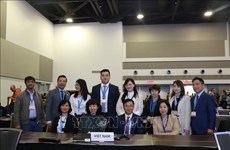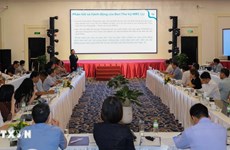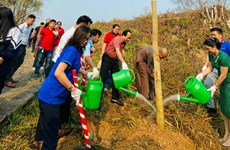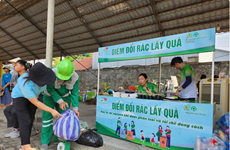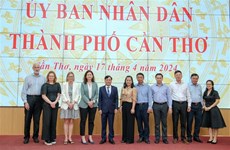Gov't seeks environmental taxes
The Government had nominated five types
of goods for its proposed environmental protection tax, Finance Minister
Vu Van Ninh told the National Assembly on May 31.
The Government had nominated five types
of goods for its proposed environmental protection tax, Finance Minister
Vu Van Ninh told the National Assembly on May 31.
These were oil and gas, coal, hydro-chloro-fluoro-carbons, or HCFCs, plastic bags and restricted pesticides.
The assembly's Finance and Budget Committee estimates yearly revenue from the tax at between 14.3 trillion VND (752 million USD) and 57 trillion VND (3 billion USD).
Economic growth, industrialisation and urban development had adversely effected the environment, said the finance minister when explaining the need for the new tax.
The assembly was assessing a Finance and Budget Committee report which argues that all products and goods that adversely effect the environment should be taxed.
But an initial selection had been to ensure domestic goods remained competitive.
While discussing the content of the draft law on the environment protection tax, most deputies said that the decision to tax only five groups of goods was insufficient.
Deputy Nguyen Thi Nguyet Huong from Hanoi said that there were many other goods that badly affected both the public and the environment that should be included on the list to ensure fairness.
Deputy Tran Dinh Long from Dak Lak province, Deputy Tran Ba Thieu from Hai Phong city and Deputy Vu Thi Thu Ha from Hung Yen province agreed, saying that the Government needed to further research and examine the list of goods to be taxed in relevant domestic and international legal documents on environment protection.
Minister of Natural Resources and Environment Pham Khoi Nguyen said that the Government and the NA had taken measures to tackle the problem of pollution such as increasing fines for violations, organising communication campaigns and stricter supervision.
He added that the law was not designed to generate revenue but, instead, to deter environmental violations.
Deputy Tran Tien Dung from Ha Tinh province said that current regulations were not strict enough to prevent acts of violation, adding that high taxes should be applied to products that were harmful to the environment which would encourage the use of environmentally friendly products.
Many deputies disagreed with the clause to exclude export products from the list because they were not consumed in the country.
They said that this was irrational because the law also needed to take into account our responsibility to protect the environment not only in Vietnam but also across the world.
Deputy Tran Ba Thieu from Hai Phong City emphasised that all kinds of goods must bear a tax if they caused pollution.
Deputy Nguyen Dinh Quyen from Hanoi said that more work needed to be carried out to avoid the overlapping of environment fees and taxes stated in different legal documents.
Deputy Ngo Van Minh from Quang Nam was concerned about the taxation of oil and gas products, saying these were ultimately necessary goods and a tax would not stop people from using them.
Deputy Le Van Hung from Hung Yen province agreed, adding that this might have an adverse impact on poor people.
Finance and Budget Committee Chairman Phung Ngoc Hien said the draft law included many new regulations that would govern activities that affect the environment.
But the impact of the legislation on production and trade, together with its relationship to other laws, would have to be assessed.
The assembly's Legal Committee reported that the draftsmen needed to re-define the legal status of the Government Inspectorate as well as its functions, tasks and competence in proposed changes to the Inspection Law.
The draft law proposes that the Government Inspectorate function as a consultant to the Prime Minister.
But Legal Committee Chairman Nguyen Van Thuan said that a ministerial-level agency, such as the Government Inspectorate, must be independent and take responsibility for its work.
The Legal Committee also argued that the draft law should be re-written to ensure the Government Inspectorate did not duplicate the tasks of the Central Steering Committee for corruption Prevention and Control; city and provincial steering committees as well as the tasks of the Supreme People's Procuracy and the Supreme People's Court in addressing complaints and fighting corruption.
The Inspectorate is a Government-affiliated agency that manages the inspection and settlement of complaints and denunciations.
It has authority to inspect and address complaints and denunciations as well as to prevent and combat corruption.
An Economic Committee assessment of proposed changes to the Minerals Law that included new and more detailed regulations did not stop disagreements among the deputies.
Many suggested that the right to issue exploratory licences should be devolved to provincial and district people's committees.
Many also argued that authority to issue licences for the exploitation and processing of natural resources, apart from construction materials and cement, should be switched from the Natural Resources and Environment Ministry to the Trade and Industry Ministry.
Others said that only the Construction Ministry should have authority to issue licences for the exploiting and processing of construction materials and cement./.
These were oil and gas, coal, hydro-chloro-fluoro-carbons, or HCFCs, plastic bags and restricted pesticides.
The assembly's Finance and Budget Committee estimates yearly revenue from the tax at between 14.3 trillion VND (752 million USD) and 57 trillion VND (3 billion USD).
Economic growth, industrialisation and urban development had adversely effected the environment, said the finance minister when explaining the need for the new tax.
The assembly was assessing a Finance and Budget Committee report which argues that all products and goods that adversely effect the environment should be taxed.
But an initial selection had been to ensure domestic goods remained competitive.
While discussing the content of the draft law on the environment protection tax, most deputies said that the decision to tax only five groups of goods was insufficient.
Deputy Nguyen Thi Nguyet Huong from Hanoi said that there were many other goods that badly affected both the public and the environment that should be included on the list to ensure fairness.
Deputy Tran Dinh Long from Dak Lak province, Deputy Tran Ba Thieu from Hai Phong city and Deputy Vu Thi Thu Ha from Hung Yen province agreed, saying that the Government needed to further research and examine the list of goods to be taxed in relevant domestic and international legal documents on environment protection.
Minister of Natural Resources and Environment Pham Khoi Nguyen said that the Government and the NA had taken measures to tackle the problem of pollution such as increasing fines for violations, organising communication campaigns and stricter supervision.
He added that the law was not designed to generate revenue but, instead, to deter environmental violations.
Deputy Tran Tien Dung from Ha Tinh province said that current regulations were not strict enough to prevent acts of violation, adding that high taxes should be applied to products that were harmful to the environment which would encourage the use of environmentally friendly products.
Many deputies disagreed with the clause to exclude export products from the list because they were not consumed in the country.
They said that this was irrational because the law also needed to take into account our responsibility to protect the environment not only in Vietnam but also across the world.
Deputy Tran Ba Thieu from Hai Phong City emphasised that all kinds of goods must bear a tax if they caused pollution.
Deputy Nguyen Dinh Quyen from Hanoi said that more work needed to be carried out to avoid the overlapping of environment fees and taxes stated in different legal documents.
Deputy Ngo Van Minh from Quang Nam was concerned about the taxation of oil and gas products, saying these were ultimately necessary goods and a tax would not stop people from using them.
Deputy Le Van Hung from Hung Yen province agreed, adding that this might have an adverse impact on poor people.
Finance and Budget Committee Chairman Phung Ngoc Hien said the draft law included many new regulations that would govern activities that affect the environment.
But the impact of the legislation on production and trade, together with its relationship to other laws, would have to be assessed.
The assembly's Legal Committee reported that the draftsmen needed to re-define the legal status of the Government Inspectorate as well as its functions, tasks and competence in proposed changes to the Inspection Law.
The draft law proposes that the Government Inspectorate function as a consultant to the Prime Minister.
But Legal Committee Chairman Nguyen Van Thuan said that a ministerial-level agency, such as the Government Inspectorate, must be independent and take responsibility for its work.
The Legal Committee also argued that the draft law should be re-written to ensure the Government Inspectorate did not duplicate the tasks of the Central Steering Committee for corruption Prevention and Control; city and provincial steering committees as well as the tasks of the Supreme People's Procuracy and the Supreme People's Court in addressing complaints and fighting corruption.
The Inspectorate is a Government-affiliated agency that manages the inspection and settlement of complaints and denunciations.
It has authority to inspect and address complaints and denunciations as well as to prevent and combat corruption.
An Economic Committee assessment of proposed changes to the Minerals Law that included new and more detailed regulations did not stop disagreements among the deputies.
Many suggested that the right to issue exploratory licences should be devolved to provincial and district people's committees.
Many also argued that authority to issue licences for the exploitation and processing of natural resources, apart from construction materials and cement, should be switched from the Natural Resources and Environment Ministry to the Trade and Industry Ministry.
Others said that only the Construction Ministry should have authority to issue licences for the exploiting and processing of construction materials and cement./.







